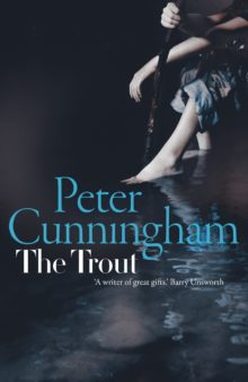| All trout eat each other, including females, who regularly consume their young. In the case of the alpha male, the choice and preferred size of prey is an adolescent fish, one-third of the predatory trout’s body-length. Alex and Kay have traded in thirty-year careers in Toronto – he as a teacher and she as a psychotherapist – to pursue more creative pursuits in rural Ontario, but things aren’t working out as well as they’d hoped. The financial crash has put their travel plans on hold and, alongside her painting, Kay is working part-time at the hospital in the next town, perhaps as much to escape their limping marriage as to boost the household’s economy. |
The voice
The novel is narrated by Alex in a gentle voice in which the reader quickly adapts to his ability to describe scenes which occur in his absence. It is accomplished without being showy, relaxed, and almost mesmerising, like sitting with on a riverbank with a fishing rod on a summer’s day, or listening to poetry in a mellifluous Irish accent which made the reveal, when it comes, all the more shocking.
A credible fictional therapist
If you’ve read my reviews of novels containing fictional therapists, you’ll appreciate that I wasn’t terribly excited about Kay’s career. But Peter Cunningham knows what he’s doing (I see from his website that his wife is a Jungian analyst): although we visit her in her office, we don’t see her in action as a therapist, although the listening skills that are inseparable from her character are deployed to move the plot forward when more of the miserable past is revealed. She’s also convincing in the back story to her vocation (p186):
an analyst told her that she had spent her life, including her childhood, caring for other people. With her father dead and her mother unable to face reality, the responsibility had all fallen to Kay. It was as if she was in a role she could not change, facing a future she could not resist. Eight later, she qualified as an analyst, and ever since, she has been listening to the problems of others
although she might have preferred an “artistic life with like-minded friends [and no] baggage from someone else’s life” (p181).
A novelist as character
Although I was similarly suspicious initially to discover this was a novel about a writer, I quickly came to appreciate Alex’s exploration of the boundary between fiction and biography. His wife hoped that (p18):
writing the novel would be a catharsis for me, that it would amount to a form of self-analysis that might help me come to terms with my problems. It seems the opposite has happened; I have become even more eccentric.
But although Alex left home more than three decades ago, when his father disowned him, he is still desperate for parental approval, having written about their relationship “not to tell the truth but to please him” (p60). While Kay understands this attempt to be accepted, she underestimates the extent to which the darkness has been denied (p76-77):
The doctor of the book, a crusty old widower with a heart of gold, was hard on his only son, fearing that to indulge him would be to spoil him; and the son was often bewildered by his father’s seeming rejection, and the beatings, losses of temper, and the bouts of lonely drunkenness. And yet the underlying love between the father in the book and his son was heart-warming, the emotions beautifully etched and delivered, Kay felt.
The gap between fiction and truth, not only in the facts themselves but in his disloyalty to the emotional truth, sees Alex travelling back to Ireland in search of the reasons for his recurring sense of guilt and shame. It also, in the shape of a childhood acquaintance seeking revenge, or at least to set the record straight, catalyses the thriller element of the novel in which Kay and her grandson seem to be at risk from a stalker, something I found, although convincingly plotted, less satisfying than the psychological themes.
The secret
When Alex travels to rural Catholic Ireland, I had an uncomfortable feeling about what might unfold. By sheer coincidence, I started reading this novel not only on the day that a misogynistic egomaniac ascended to the most powerful position in the universe but after a surprise critical comment on one of my old posts about a fictional perspective on childhood sexual abuse within the Catholic Church. Wanting to be open-minded, I don’t think I realised how disturbed I was by a comment seeming to excuse, or at least underplay, the offence by appeal to the higher authority of the divine. But it’s exactly this sense of being above criticism and the culture of obedience to authority that enables the bullies and abusers to flourish. So, although I wasn’t shocked on learning of the corrupt behaviours with which Alex had unwittingly concluded, I was disturbed. And rightly so. Anyone who believes the billionaire in the White House can be trusted to govern for the good, should read this novel. If and when I manage to process my thoughts a bit better, I’ll be adding to the comments on Charli Mills’ timely post about a safe space for writers.
| The quarry As it happens, it was also partly due to Charli that I picked up this book when I did. With a challenge to write a 99-word story about a quarry, I thought I’d have to recycle one from last year about the millstone manufacturing industry, until I had a closer look at my TBR shelf. While the prompt related to geology, I thought a novel featuring fishing might work on the metaphorical level. If you’ve read this far you’ve probably gathered that pursuit of the trout in The Trout is itself a metaphor both for taking advantage of the vulnerable and for Kay’s stalker, but I did enjoy the short paragraphs on the intricacies of fly-fishing, about which I previously knew nothing, and was delighted to find one that fits perfectly with the prompt (p72): |
Fly fishing allows man to revert to his state of being a natural hunter and to stalk his quarry as he has done since memory began. Fly fishing allows man to act out an elemental part of the forest glade that lies within us all.
After reading such a powerful novel, I can’t resist composing a flash on a similar theme.
| To swim in the quarry Father Gregory at the wheel, Father Benedict beside him. Three boys and their towels in the back. No room for me. “Get your dad to take you.” Yeah, right, if we had a car. Kicking a ball across melting tarmac, my envy burned. Why did those scruffs get to swim in the quarry? Snotty nosed kids from broken homes, not even the manners to look grateful. Years later, I hiked past the quarry, the pool filled in with rubble since the scandal broke. Understood how I’d been the lucky one. Wondered if the boys’ memories were buried so deep. |
























 RSS Feed
RSS Feed





















